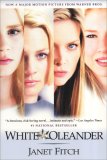Summary | Excerpt | Reading Guide | Reviews | Readalikes | Genres & Themes | Author Bio

The apartment was very different from ours, crammed with furniture and souvenirs and movie posters, Variety and newspapers and empty wine bottles, tomato plants straggling on the windowsills, groping for a little light. It was dark even in the daytime, because it faced north, but it had a spectacular view of the Hollywood sign, the reason he took it in the first place.
"Snow again," he said along with Garbo, tilting his face up like hers. "Eternal snow." He handed me a bowl of sunflower seeds. "I am Garbo."
I cracked seeds in my teeth and flicked off the rubber sandals I'd been wearing since April. I couldn't tell my mother I'd outgrown my shoes again. I didn't want to remind her that I was the reason she was trapped in electric bills and kid's shoes grown too small, the reason she was clawing at the windows like Michael's dying tomatoes. She was a beautiful woman dragging a crippled foot and I was that foot. I was bricks sewn into the hem of her clothes, I was a steel dress.
"What are you reading these days?" I asked Michael. He was an actor, but he didn't work that much, and he wouldn't do TV, so he made most of his money reading for Books on Tape. He had to do it under a pseudonym, Wolfram Malevich, because it was nonunion. We could hear him every morning, very early, through the wall. He knew German and Russian from the army, he'd been in army intelligence — an oxymoron, he always said — so they put him on German and Russian authors.
"Chekhov short stories." He leaned forward and handed me the book from the coffee table. It was full of notes and Post-its and underlines.
I leafed through the book. "My mother hates Chekhov. She says anybody who ever read him knows why there had to be a revolution."
"Your mother." Michael smiled. "Actually, you might really like him. There's a lovely melancholy in Chekhov." We both turned to the TV to catch the best line in Queen Christina, saying along with Garbo, "The snow is like a white sea, one could go out and be lost in it . . . and forget the world."
I thought of my mother as Queen Christina, cool and sad, eyes trained on some distant horizon. That was where she belonged, in furs and palaces of rare treasures, fireplaces large enough to roast a reindeer, ships of Swedish maple. My deepest fear was that someday she would find her way back there and never return. It was why I always waited up when she went out on nights like this, no matter how late she came home, I had to hear her key in the lock, smell her violet perfume again.
And I tried not to make it worse by asking for things, pulling her down with my thoughts. I had seen girls clamor for new clothes and complain about what their mothers made for dinner. I was always mortified. Didn't they know they were tying their mothers to the ground? Weren't chains ashamed of their prisoners?
But how I envied the way their mothers sat on their beds and asked what they were thinking. My mother was not in the least bit curious about me. I often wondered what she thought I was, a dog she could tie in front of the store, a parrot on her shoulder?
I never told her that I wished I had a father, that I wanted to go to camp in summertime, that sometimes she scared me. I was afraid she would fly away, and I would end up alone, living in some place where there were too many children, too many smells, where beauty and silence and the intoxication of her words rising in air would be as far away as Saturn.
Out the window, the glow of the Hollywood sign was slightly blurred with June fog, a soft wetness on the hills raising the smell of sage and chemise, moisture wiping the glass with dreams.
She came home at two when the bars closed, alone, her restlessness satisfied for the moment. I sat on her bed, watched her change clothes, adoring each gesture. Someday I would do this, the way she crossed her arms and pulled her dress over her head, kicked off her high heels. I put them on, admiring them on my feet. They were almost the right size. In another year or so, they would fit. She sat down next to me, handed me her brush, and I brushed her pale hair smooth, painting the air with her violets. "I saw the goat man again," she said.
© 1999 by Janet Fitch. Reprinted with permission of the publisher, Little,Brown & Co.
Your guide toexceptional books
BookBrowse seeks out and recommends the best in contemporary fiction and nonfiction—books that not only engage and entertain but also deepen our understanding of ourselves and the world around us.